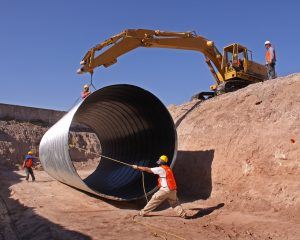Need Immediate help? Call 717-397-1010
After Hours Call / Text 717-471-2168
Need Immediate help? Call 717-397-1010
After Hours Call / Text 717-471-2168
 Workers’ compensation is a no-fault form of insurance that covers injuries that workers incur on the job. It is available for the protection of both the employer and the employee. For the employee, it provides compensation for medical expenses for injuries or illnesses that occur on the job, as well as compensation for lost wages and disability if applicable. For the employer, workers’ compensation offers protection against getting sued for injuries that take place on your farm: the availability of insurance precludes the workers’ right to file a personal injury claim. Though there is a Farm Labor Exemption for certain farm sites in Pennsylvania, most farms in the Commonwealth will not qualify for these exemptions, as they generally only apply to extremely small operations who hire workers for very short periods of time.
Workers’ compensation is a no-fault form of insurance that covers injuries that workers incur on the job. It is available for the protection of both the employer and the employee. For the employee, it provides compensation for medical expenses for injuries or illnesses that occur on the job, as well as compensation for lost wages and disability if applicable. For the employer, workers’ compensation offers protection against getting sued for injuries that take place on your farm: the availability of insurance precludes the workers’ right to file a personal injury claim. Though there is a Farm Labor Exemption for certain farm sites in Pennsylvania, most farms in the Commonwealth will not qualify for these exemptions, as they generally only apply to extremely small operations who hire workers for very short periods of time.
Pennsylvania’s Workers’ Compensation Act has a subsection that is specifically devoted to agricultural worksites. This section indicates that workers’ compensation is to be provided for employees if during a calendar year they pay wages to a single employee totaling $1,200 or more, or who employs a single employee for 30 or more days. Even if the farm has just one employee that meets that description, the workers’ compensation insurance coverage needs to be provided for all employees. The employers’ spouse or child under the age of 18 is not considered an employee under the law unless there is a specific written employment contract in place.
Many farm owners in Pennsylvania make the mistake of believing that they do not need to have workers’ compensation insurance because of the agricultural employee exemption, but the only farms for which this applies are generally those who only hire seasonal labor for extremely short periods of time. If an employer is required under the state’s rules does not purchase workers’ compensation insurance, they can be penalized for their failure to do so. They are also likely to be held liable for any injury that occurs on the job as a result of negligence.
If you are an agricultural worker who has been injured on the job, you are entitled to compensation for your injuries, but you need an experienced workers’ compensation attorney to guide you through the process and advise you of your rights. Contact the attorneys at Vanasse Law today to learn more.
 To most people, workers’ compensation is little more than a line item in their paycheck. They don’t know whether it’s something that they pay for or whether it’s provided by their employer, and they’re not entirely sure what it’s there for. That all changes once you’re injured on the job and suddenly realize that it’s there for you – to make sure that your medical expenses are covered, and you’ll be able to pay your bills, even if your injury keeps you from going back to work. Though workers’ compensation is what’s known as a ‘no-fault’ insurance policy that’s paid without having to prove who’s at fault, there are a couple of notable exceptions. Here are the circumstances under which injuries sustained at work are not covered.
To most people, workers’ compensation is little more than a line item in their paycheck. They don’t know whether it’s something that they pay for or whether it’s provided by their employer, and they’re not entirely sure what it’s there for. That all changes once you’re injured on the job and suddenly realize that it’s there for you – to make sure that your medical expenses are covered, and you’ll be able to pay your bills, even if your injury keeps you from going back to work. Though workers’ compensation is what’s known as a ‘no-fault’ insurance policy that’s paid without having to prove who’s at fault, there are a couple of notable exceptions. Here are the circumstances under which injuries sustained at work are not covered.
If you’ve been hurt while on the job and you’re not sure whether workers’ compensation benefits are available to you or not, contact the workers’ compensation attorneys at Vanasse Law to set up a consultation to discuss your situation.
 Lump Sum Settlements
Lump Sum SettlementsA lump sum settlement pays your workers’ compensation payment on a full and final basis, closing your claim. The disadvantage of this is that you will not be able to file any additional treatments that you need later or any additional diagnosis that may arise as a result of the injury. The biggest advantage of a lump-sum settlement would be the ability to invest the money in a way that might provide you with an additional source of income.
A structured settlement provides guaranteed payments, usually on a weekly, monthly or annual basis. It may be set up as a payment for a specific duration, or it may be set up as a payment for the rest of the injured worker’s life. The advantages of a structured settlement are twofold: first, it guarantees income over an extended period, providing for both medical expenses and living expenses. It also has the advantage of being paid in nontaxable payments, where the interest earned on a lump sum settlement will be taxable. The downside of a structured settlement is that if you decide in the future that you’d prefer to have all the balance of your compensation paid out in a single payment, it may be impossible or subject to financial penalties.
Making the decision between a lump sum or a structured settlement requires careful thought and consideration of your needs and level of discipline. There’s no doubt that a structured settlement will prevent you from spending more than you should and provide you with a completely reliable source of income. For guidance on this and other workers’ compensation questions, contact Vanasse Law to set up a personal consultation.
 While it is considered common knowledge that Workers’ Compensation cases go before a judge, it is often not understood what role a judge plays in such a case. Even further, it is not typical that the average worker knows what power the judge has or what the judge is able to do or accomplish during such a case. However, understanding that role could mean a stronger case and a more informed worker. When it comes to collect these benefits, being a self-advocate and understanding your rights is imperative.
While it is considered common knowledge that Workers’ Compensation cases go before a judge, it is often not understood what role a judge plays in such a case. Even further, it is not typical that the average worker knows what power the judge has or what the judge is able to do or accomplish during such a case. However, understanding that role could mean a stronger case and a more informed worker. When it comes to collect these benefits, being a self-advocate and understanding your rights is imperative.
Getting the right lawyer is the most important element. Lawyers have a deep understanding of the role and power of a judge, which enables them to make different legal decisions to strengthen a case and move things along. However, knowing this on your own can only help your case.
The first thing a judge in Pennsylvania must do when considering a Workers’ Compensation case is to determine whether mediation is required, which is often the case. In fact, some judges force all cases to go to mediation first. Other judges only require mediation when it seems the action will lead to a quicker conclusion. Mediation in Workers’ Compensation cases entails sitting both parties down, meaning the injured worker and the insurance company with their respective legal counsel, to attempt to find a settlement during a neutral discussion.
In mediation, the judge cannot force a decision. Instead, the two parties must work together to find a settlement both can agree on. The judge sitting on the mediation will promote compromise but is not in the position to force it or make a judgment. In these cases, it’s best to refer to your own legal counsel, who is the only one with your individual interests in mind, as the judge is looking for a quicker conclusion. When proposals are made, you are free to reject them as there is not a judgment being made. If a conclusion is reached, a compromise and release hearing must be held.
If an agreement was made in mediation, the judge must ensure the injured worker understands the legal significance of the agreement and that they understand what the worker is doing by settling the case. The judge does not have the power to reject an unfair settlement, but it is their duty to ensure the worker knows what they are gaining and giving up for their settlement. For instance, the worker should know if they are getting a lump sum or how long monthly payments will last. Only the plaintiff and their legal counsel can accept or reject an offer.
At the end of the day, having the right lawyer is what makes or breaks a Workers’ Compensation case. Contact our team today to find out how we can help with your Workers’ Compensation claim.
 Wading through the waters of Workers’ Compensation can lead to a lot of confusion and misinformation. By understanding ahead of time the common myths and the real truth behind them, workers can better advocate on their own behalf when it comes to filing for benefits. In the last post, we covered two myths and one truth, continuing with other common misconceptions below.
Wading through the waters of Workers’ Compensation can lead to a lot of confusion and misinformation. By understanding ahead of time the common myths and the real truth behind them, workers can better advocate on their own behalf when it comes to filing for benefits. In the last post, we covered two myths and one truth, continuing with other common misconceptions below.
While technology has certainly helped the claim process and made it simpler, it won’t solve everything. The advances that have been made in recent years have worked wonders in making things operate smoother and creating a faster and more efficient way to file claims. However, there are now too many companies that put their focus on decisions based on technology selection rather than looking at the end result.
Having foresight is not something technology can accommodate. Instead, technology should be used for identifying what needs to be accomplished and tracking solutions. However, technology should not be relied on for creating goals and individualization of solutions.
Many believe that due to the differences between state Workers’ Compensation systems and FECA, the best practices associated with private sector case management won’t work as well. Evidence, however, suggests that the best practices work in both, despite the often-cited differences such as federal agencies’ inability to choose a third-party administrator, no settlements, 45 days of continuation of regular pay, a lack of a system for routine utilization review, free choice in the treatment provider, and the limited clinical resources.
However, the best practices include agency-directed case management over the phone, intervention at an early time, a focused approach to case management, initiatives for stay-at-work and return-to-work initiatives, and trend analysis for metrics and audits. These practices can be applied to both FECA and private sector case management as they address many of the same issues they both have.
The best course of action when it comes to Workers’ Compensation claims is to find the right legal counsel. At Vanasse Law, we understand the Workers’ Compensation process in Pennsylvania and will put our experience to work for your claim’s success. Contact us today to find out more.
 Understanding the system in the benefits being part of the workforce makes available shouldn’t require a law degree. There is a lot of misinformation about Workers’ Compensation benefits out there, which leads to many injured workers not filing for benefits when they should. By separating fact from fiction, it is much easier to navigate through the myths that surround Workers’ Compensation.
Understanding the system in the benefits being part of the workforce makes available shouldn’t require a law degree. There is a lot of misinformation about Workers’ Compensation benefits out there, which leads to many injured workers not filing for benefits when they should. By separating fact from fiction, it is much easier to navigate through the myths that surround Workers’ Compensation.
The price might be right, but large discount networks can be unsustainable. There has been a plateau, for the most part, in which these networks can control medical costs. Having a layered approach to coverage is a better way to see what is being spent and where. Every employee is unique, so every company won’t need the same one-size-fits-all approach. While that approach can work well with vehicles, human beings don’t all face the same dangers that cars do. Instead, we all have different occupations and are at risk for different injuries. While each car drives on the road, risking collisions, there is a major difference in the occupational diseases that may befall a desk worker compared to a miner.
In fact, it is after the claim is paid that an employer plays the most pivotal role. The employer must make regular contact with the employee to stay abreast of the changes in the healing process which can help inform the approach to the employee’s return to work. While 86% of companies have a return to work program, very few have finessed a program that helps workers slowly return to work based on where they are in their recovery. By maintaining regular contact, it is much easier to know when the right time is to reintroduce them slowly into the workplace.
In most cases, they can actually become more complex. Many adjusters assume that the person will go through a healing process, leading to fewer and fewer expenses until the bills end. But this is more often false than true. In the past decade, medical costs have inflated by 48% which means the same medical treatments will increase in cost, even if the treatment doesn’t change. In some cases due to inflation, someone could receive less care and cost more down the line. Further, the longer someone is out of work, the more likely it is that they won’t return.
Getting the most out of your claim can come down to having the right legal counsel on your side. Contact our team at Vanasse Law today to find out how we can help guide you through the Workers’ Compensation process.
 When you get a permanent work injury on the job, the category the injury falls under is likely the last thing on your mind. However, understanding the key differences between scheduled and unscheduled work injuries can help you understand how to better apply for benefits and understand why you received or didn’t receive certain benefits. The two have one major component in common: they are both permanent injuries. However, there are very important key differences in the type of injury, as they each cover a different section of permanent injuries.
When you get a permanent work injury on the job, the category the injury falls under is likely the last thing on your mind. However, understanding the key differences between scheduled and unscheduled work injuries can help you understand how to better apply for benefits and understand why you received or didn’t receive certain benefits. The two have one major component in common: they are both permanent injuries. However, there are very important key differences in the type of injury, as they each cover a different section of permanent injuries.
Depending on the injury, permanent injuries can be full or partial, leading to a lifetime of impairment that keeps workers out of the workforce or a change to position and duties. Workers’ Compensation breaks permanent injuries into two categories to better understand what type of permanent injury has occurred and what benefits are available.
Permanent work injuries that involve a part of the body are considered scheduled injuries and include injuries to eyes, arms, hands, feet, ears, or legs. With this type of work injury, there is a set amount of time in which compensation can be collected as per state law, legal precedent and insurance company policies that are preset. After a percentage of disability is determined by the physician, there is a formula that is used that will calculate benefits for your permanent disability which pays out awards over a predetermined number of months that is shown in the formula.
After this amount has been delved out, benefits end. This is where being prudent comes in handy. Often, there will be miscalculations that are common but they are often in favor of the insurance company. Also, be sure to find out if you are eligible for vocational training that can help with a career after recovery.
This type of injury often describes the more “general” types of disabilities such as occupational diseases, hip injuries, shoulder injuries, and two scheduled injuries. Those who have filed for Workers’ Compensation are usually eligible, even when the claim for Workers’ Compensation was filed in a different state. With an unscheduled injury reward, benefits tend to be based on the reduction in the ability to earn rather than strictly the percentage of a disability. This can be tricky for those filing as it can be possible to be denied the award even if you have a disability.
Regardless of the type of injury, having the right legal counsel is essential in reaping the rewards you deserve. Contact us at Vanasse Law today to find out more.

Worker’s Compensation is a type of insurance coverage that helps financially and medically support injured workers that have been harmed on the job as they recover. The benefits aim to cover the daily life of workers while they take on the healing process to rejoin the workforce. However, too few workers in Pennsylvania are aware of the potential coverage and how the benefits work.
There are two separate laws that govern and regulate Worker’s Compensation claims in the state of Pennsylvania: the Pennsylvania Workers’ Compensation Act and the Occupational Disease Act. The two pieces of legislation are enforced by special administrative judges, referred to as Worker’s Compensation judges. When an appeal occurs, it is handled by the Workers’ Compensation Appeal Board. Only under rare and extenuating circumstances is a claim heard by the local Court of Common Pleas.
There are time limits on claims that must be adhered to in order to retain rights to benefits. As such, the sooner an employer is informed of a work injury, the better. A worker has up to 30 days from the first manifestation of an injury, illness, or disease to inform the employer. However, there is no advantage to waiting whereas there are many benefits to informing the employer right away.
The insurance company is required to pay all medical expenses within 30 days from the time they receive the bills and records from the healthcare provider. In most cases, an insurer won’t pay bills without informing the injured worker. However, in many cases, the injured worker won’t know there was a failure to pay until the health care provider informs them rather than the insurer. If an insurer fails to pay a claimant’s bills, they take on the risk of penalties of non-payment.
Nearly all claimants are eligible to receive a lump sum settlement but the amount awarded depends on the severity of the injury, how much the worker earned on the job prior to becoming injured, how the physician treating the injury describes the injury, and many other relevant factors. In some cases, a lump sum is not the best strategy, depending on the circumstances of the case.
At Vanasse Law LLC, we have years of focused experience in Worker’s Compensation claims. If you are unsure of how to proceed with your claim, contact us today to talk to a seasoned professional.
Forging a new claim under the Pennsylvania Workers’ Compensation Act can be daunting. The beginning stages can be tough and can determine how smoothly your recovery will go. In the last blog post, we explored half of the six types of Worker’s Compensation and how they work to aid workers in their recovery process after a work-related injury.
In this post, we will look at the other three types of Worker’s Compensation in Pennsylvania and what can be covered by insurance after a work injury.
Any medical care that is necessary for recovery and is deemed reasonable and medically-related to your work injury is required to be covered by the employer. This can extend beyond the typical doctor’s visitations such as the cost of renovations to a home or vehicle for those that are severely injured. Unlike other types of compensation, there is no real limit or restriction on medical expense coverage. This is to ensure injured workers receive the necessary care to return to the work force.

Not all cases are cut and dry. In some cases, an injury can result in a bigger loss than goes beyond typical coverage under the Act. Payment for such injuries is equal to total disability benefit rates for the same time period and healing periods after the injury. Examples of such injuries include loss of hearing or vision, along with amputation of a body part such as fingers, hands and toes.
When injury leads to death, there can still be compensation involved. If the worker injured dies as the result of an occupational injury or illness within 300 weeks of the injury or of the last exposure to the hazard that led to the condition, the family may collect benefits. This includes $3,000 for funeral expenses and the widow or widower is entitled to the compensation the worker would have received if they did not die until he or she remarries.
Children of the worker are also entitled to compensation until the turn 18 years old, or 23 years old if they are in school such as an accredited college. The benefits collected by the children or the spouse is equal to the percentage of what the deceased worker would have made on average. This becomes the same amount that would have been collected in a total disability case.
If you or your loved one was injured at work, your family is entitled to compensation. Contact our law firm today to find out how our expertise can help your claim.
 Originally passed in 1915, the Pennsylvania Workers’ Compensation Act was set forth as a state-wide insurance system on a no-fault basis aimed to provide injured workers with benefits, lost wages and medical coverage. The intent of the Act is not to replace all wages for the worker but to give a percentage of wages to help aid recovery after a work-related injury. The Act also does not cover non-economic damages. This means if pain and suffering come as a result of injury, the worker will have to pursue those damages separately.
Originally passed in 1915, the Pennsylvania Workers’ Compensation Act was set forth as a state-wide insurance system on a no-fault basis aimed to provide injured workers with benefits, lost wages and medical coverage. The intent of the Act is not to replace all wages for the worker but to give a percentage of wages to help aid recovery after a work-related injury. The Act also does not cover non-economic damages. This means if pain and suffering come as a result of injury, the worker will have to pursue those damages separately.
Depending on the injury, workers will be eligible for different coverage under the Act. There are six types of Worker’s Compensation in Pennsylvania, leading to better coverage for different types of injury. The categories are important to understand after injury as pursuing the wrong type could lead to denial of coverage or you may receive less coverage than you were entitled to.
Total Disability Benefits
In most cases, total disability benefits are paid as long as the person is not able to work if supported by medical documents. There will often be a medical exam after two years to determine if the person is able to return to work or if coverage will continue. In cases where the worker is found to have less than a 50% whole body impairment, the benefits may be limited to a maximum of 500 weeks and will be considered to be partially disabled and weekly payments will stay the same. However, insurance companies will be able to attempt to lower the disability benefits by offering vocational rehabilitation during those 500 weeks of partial disability benefits.
Partial Disability Benefits
These benefits are available for up to 500 weeks after the partial disability status has been determined either by an official exam or if the doctor under the insurance carrier feels the worker has the capacity to perform light-duty work. Partial disability is a way of saying the person is not fully recovered from the injury and be offered a new position to fit their disability. If the new position pays less than the position held prior to injury, the worker is entitled to two-thirds of the difference in average weekly wage.
Expenses for Travel
Under the Act, expenses to travel to and from medical providers are not reimbursable but workers may be entitled to compensation if the travel for treatment is not available in their community. If you are not able to travel on your own to the treatment, insurance is also required to provide transportation to the Independent Medical Examination needed to determine coverage.
These three are the first to understand the types of coverage when seeking Workers’ Compensation benefits. If you have questions about your claim, contact us today to work with a law firm well-versed in the laws surrounding Workers’ Compensation.